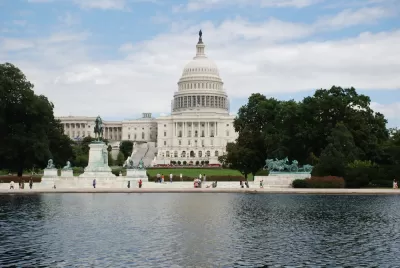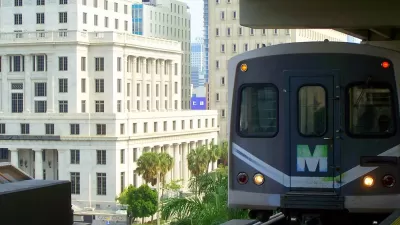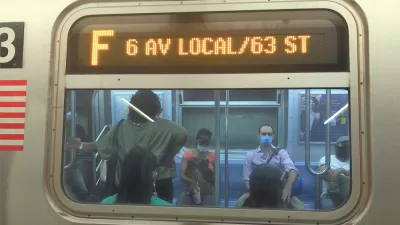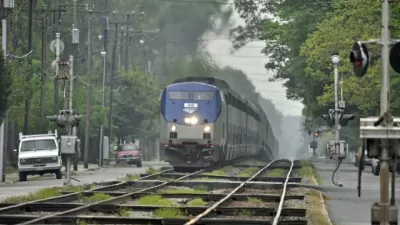The economic fallout of the COVID-19 pandemic has already hit public transit revenues hard, and the concerns of millions of renters around the country about how they'll afford to pay the rent are weighing heavily on the country.

[Update: the text of the Senate version of the bill [pdf], and a summary, have been released [pdf].]
"Senators and Trump administration officials reached an agreement early Wednesday on a sweeping, roughly $2 trillion stimulus measure to send direct payments and jobless benefits to individuals as well as money to states and businesses devastated by the coronavirus pandemic," report Emily Cochrane and Nicholas Fandos.
"Lawmakers and aides were still drafting portions of the bill early Wednesday morning," according to the article, so a text of the bill was not available as of this writing, but initial reports indicate that transit and housing will both receive a sizable infusion of funding in the final version of the bill.
Diane Yentel of the National Low Income Housing Coalition is on Twitter this morning, sharing news about the stimulus package’s funding for housing. According to Yentel, the stimulus bill will include (in addition to other sums of money):
- $4 billion in Emergency Solutions Grants to assist homeless shelters and outreach workers working to reduce risks from the coronavirus for the homeless.
- $5 billion in Community Development Block Grants, which can be used for rental assistance.
- $685 million for public housing.
- $1.25 billion in Tenant-Based Rental Assistance [pdf].
- $1 Billion in Project-Based Rental Assistance [pdf].
Yonah Freemark, a transportation researcher at MIT who also runs The Transport Politic website, is also on Twitter this morning mining the available information about the stimulus bill for details on transit for beleaguered public transit systems.
According to Freemark, the bill includes $25 billion for public transit agencies, including funding for operations. The bill almost triples annual spending on transit from the federal government, and provides a huge infusion of dollars for transit operations, according to Freemark, "which have been mostly off-limits for federal transit funding for years."
Calyton Guse, New York Daily News transit report, is also on Twitter reporting details of the bill specific to public transit in New York. In total, the state of New York will receive $4.35 billion for transit, including $3.8 billion just for the MTA.
The MTA had asked Congress for $4 billion in funding last week, and the American Public Transportation Association (APTA) asked for $12.5 billion for all transit agencies, so the final stimulus bill, expected to pass later today, increased the funding on both those requests.
Planetizen will continue to update this story as more details emerge.
FULL STORY: Congress and White House Strike Deal for $2 Trillion Stimulus Package

Manufactured Crisis: Losing the Nation’s Largest Source of Unsubsidized Affordable Housing
Manufactured housing communities have long been an affordable housing option for millions of people living in the U.S., but that affordability is disappearing rapidly. How did we get here?

Americans May Be Stuck — But Why?
Americans are moving a lot less than they once did, and that is a problem. While Yoni Applebaum, in his highly-publicized article Stuck, gets the reasons badly wrong, it's still important to ask: why are we moving so much less than before?

Research Shows More Roads = More Driving
A national study shows, once again, that increasing road supply induces additional vehicle travel, particularly over the long run.

Judge Halts Enforcement of Anti-Homeless Laws in Grants Pass
The Oregon city will be barred from enforcing two ordinances that prosecute unhoused residents until it increases capacity and accessibility at designated camping sites.

Advancing Sustainability in Los Angeles County Schools
The Los Angeles County Office of Education’s Green Schools Symposium brings together educators, students, and experts to advance sustainability in schools through innovative design, climate resilience strategies, and collaborative learning.

Using Old Oil and Gas Wells for Green Energy Storage
Penn State researchers have found that repurposing abandoned oil and gas wells for geothermal-assisted compressed-air energy storage can boost efficiency, reduce environmental risks, and support clean energy and job transitions.
Urban Design for Planners 1: Software Tools
This six-course series explores essential urban design concepts using open source software and equips planners with the tools they need to participate fully in the urban design process.
Planning for Universal Design
Learn the tools for implementing Universal Design in planning regulations.
City of Moreno Valley
Institute for Housing and Urban Development Studies (IHS)
City of Grandview
Harvard GSD Executive Education
NYU Wagner Graduate School of Public Service
City of Cambridge, Maryland
Newport County Development Council: Connect Greater Newport





























